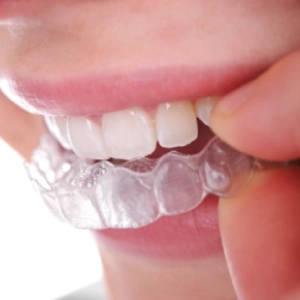Are you dreaming of a straighter smile but hesitant about traditional metal braces? You're not alone! Thankfully, exploring alternatives for straightening teeth is easier than ever. Advancements in dental technology have opened up a world of possibilities, allowing you to achieve a confident smile without the drawbacks of braces.
The best approach for you will depend on the severity of your misalignment and your dental history. Your dentist is your partner in this journey, and they'll help you choose the ideal solution. In some cases, braces might be the only way to go. But if you're open to exploring alternatives, you might find options that offer
Beyond traditional braces, there are various alternatives for straightening teeth. Discover these innovative methods to transform your teeth without metal brackets.
Traditional metal braces comprise fixed brackets, wires, and elastic bands, working in tandem to shift teeth into their desired positions. Typically crafted from stainless steel, brackets are complemented by metal alloy wires. Modern braces are notably smaller and lighter compared to earlier iterations, and patients may even have the option to select the color of their brackets and bands. The average cost of traditional metal braces ranges from $2,500 to $7,500.
Operating similarly to metal braces, traditional ceramic braces offer a discreet alternative with tooth-colored brackets. Constructed from ceramic or porcelain materials, these brackets blend in with the natural color of teeth, making them less conspicuous. While the brackets may be less noticeable, treatment costs can vary and may be slightly higher compared to traditional metal braces. Ceramic braces cost from $3,000 to $10,000.
Damon braces feature self-ligating brackets, employing a slide mechanism instead of elastic bands to secure wires. Damon braces may also reduce treatment duration by offering a less conspicuous appearance compared to traditional braces. However, they may entail a slightly higher cost compared to conventional braces. Damon braces can cost you around $2,500 to $8,000.
Often dubbed invisible braces, lingual braces are affixed to the inside surface of teeth, concealed from view. Ideal for individuals seeking orthodontic treatment without the outward appearance of braces, lingual braces are customized for each patient. However, due to their customized nature and concealed placement, they may incur higher costs compared to traditional braces. You may have to pay around $5,000 to $13,000 for lingual braces.
Clear aligners like Invisalign®, Clear Correct®, and Reveal Clear Aligners® offer a series of custom-made, removable aligners. Patients wear these aligners akin to a retainer, replacing them approximately every two weeks until teeth have shifted into the desired position. Less conspicuous than traditional braces, these aligners offer added convenience as they can be easily removed for eating, brushing, and flossing. Getting in-office aligners at a dental clinic can cost around $3,500 to $8,500.
Teledentistry companies such as SmileDirectClub offer clear aligners without the need for an orthodontist visit. These aligners, also known as "teledentistry braces" or "at-home braces," provide a convenient and potentially more affordable option. However, eligibility for at-home aligners may depend on the severity of dental misalignment, and professional oversight by a dentist is recommended for optimal results. If you’re thinking about at-home aligners, then you have to pay around $1,200-$2,500.
Companies like Six Month Smiles® offer short-term treatment options for individuals seeking cosmetic straightening benefits without requiring extensive bite corrections. With a shorter treatment duration and reduced cost than traditional braces, this option appeals to those prioritizing efficiency and affordability. You may have to pay between $3,500 and $5,000 for short-term treatment.

Retainers are commonly used post-active orthodontic treatment to maintain teeth in their new positions. Available in permanent or removable forms, retainers may also serve as a standalone teeth-straightening option for individuals requiring minimal dental correction. Retainers may cost around $100-$500.
Dentists utilize dental bonding as a cosmetic technique to address crooked or uneven teeth. This procedure involves shaping and applying a soft resin onto the teeth to close gaps, repair chips, and enhance the smile's overall appearance. Dental bonding costs around $300-$600 per tooth.
Dental veneers are thin, tooth-colored shells affixed to the front surfaces of teeth to enhance their appearance. For those seeking a temporary option, companies like Snap-On Smile® offer custom-made, removable dental arches suitable for individuals with minor dental imperfections. The cost of getting dental veneers varies between $1,000-$3,500 per arch.
Traditional braces are no longer the only option when it comes to straightening teeth. Individuals can choose the treatment method that best fits their lifestyle, preferences, and orthodontic needs with various alternatives for straightening teeth.
Call (647) 931-2983 to schedule an appointment with the dental experts at Invisalign Toronto, or you can also visit our clinic in Front Street West Toronto.
Unfortunately, there are no safe and effective means to straighten your teeth at home without the expertise of a dentist or orthodontist. Attempting DIY methods such as gnawing on sticks, using rubber bands, or pushing on your teeth can lead to unintended consequences and potential harm. For a healthy and aesthetically pleasing smile, professional care is always recommended.
While traditional braces can be pricey, these clear, removable aligners offer a budget-friendly alternative. Typically costing between $2,000 and $5,000, some options like Byte can be even more affordable, starting at just $1,999.
Despite limitations, clear aligners offer effective teeth straightening, sometimes even faster than braces, thanks to their precise pressure application.